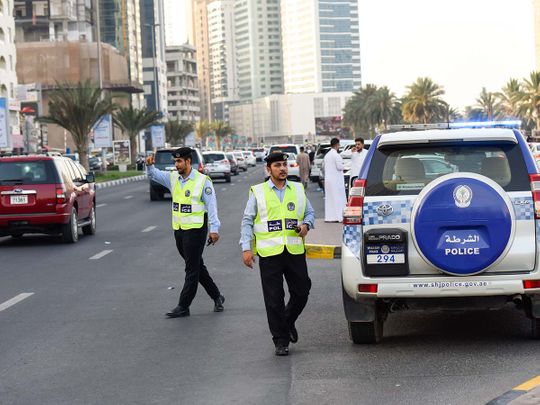ETHICAL
- SCENARIO
Hamad is a traffic police officer at Ras Al Khaimah police force. He is on duty on the road with a police car and a speed detector. Suddenly, he spots an over speeding driver on a luxury car. Immediately, he began to pursue the driver using the police car. Soon he catches up with him and forces the driver to stop. He goes towards the car and finds the driver is also drinking wine. He demands answers as to why the driver was speeding. The driver denies that he was speeding.

Hamad takes out the speeding detector, and it shows the driver was driving at a speed of 200Km/Hr. Hamad informs the driver that the road has a maximum speed allowance of 120Km/Hr. The driver insists that the difference is not that much. He asks for a driving license from the driver and notices that the driver is from a wealthy and influential family. As they are talking, Hamad notices that the driver might be drunk.

He asks the driver to get out so that he can take the alcohol test. He finds the driver drunk and requests him that the car should be sophisticated and taken to the police. The driver refuses and offers Hamad some money. After several minutes, Hamad agrees and takes the money. Ahmed an off-duty police officer and a brother to the driver witnesses the situation.
Ahmed is faced with a dilemma. Should he report the matter, or protect his brother. What are the choices available for Ahmed?
- Analysis
- Ethical Theory: deontology theory
- Definition
- Ethical Theory: deontology theory
The view of deontology theory focuses on the rules of morality and the requirement of the duty. It also focuses on justice (Hooker, 2012, p.1).
- Analysis
In the application of the deontology, it is very necessary to know and understand the proximity of the situation (Bethamj, 2009, p. 34). It is relevant to know and understand the rules and the duty that match the situation. In the scenario, the incident affects the unit that is the police force. The police force is the arm of the government that is required to implement and enforce the rule of law (ladkin, 2006, p.87). The police officer Mr. Hamad is obligated to enforce the rule of law regardless of who is affected.

He is supposed to make an arrest to any law breaker and take him or her to court to be charged (Sander, 2005, p.75). The driver breaks several laws. First he over speed, then he was drinking thus was drunk. Lastly, he offered the officer the bribe (Mcnaughton & Rowling, 2007, p. 65). The officer Mr. Hamad takes the money and lets the driver go.
The action of the officer results to corruption due to bribery (Kuziemko, & Werker, 2006, p. 905). Therefore, all actions resulted to criminal offenses. Mr. Ahmed being a police officer with a duty to report, implement, and enforce the rules of law should report the matter (Skeiker, 2005, p. 751-789). He should report all actions from over speeding, drunkenness, and corruption (bribery).
- Ethical Theory: Utilitarianism theory
- Definition
Utilitarianism theory focuses on the morality (Bossert, & Donaldson, 2002, p.543). It entails that an action of morality gives maximum utility.
- Analysis
In the utilitarian context, the focus is in the best interest (Crisp, 2002, p.42). The bright side of the situation is the officer Mr. Hamad gives the driver the second chance (Mill, 2007, p.4). If he had reported the matter, the driver would have found himself in a difficult situation. Thus, the police officer saves the driver’s court suit (Mill, 2010, p.7).
The other thing is that the police officer Mr. Hamad did not want to make the family of the driver worried. He also wanted to make his work easier because the driver comes from an influential and wealthy family (Noddings, 2002, p.37). The driver’s family could easily influence his superior to sack him hence affecting his daily life by losing means of income.
Since he was on duty, he would be required to prepare the report on the issue and then be the witness in the court of law (Rosen, 2003, p. 44). However, it would bad and unethical for the behavior to continue (Rosen, 2000, p. 47). Police officers should be seen as keen people who follow the rules of law and implements them effectively. This thus means Ahmed should report all the three matters to the relevant authorities.
- Ethical Theory: virtue ethics
- Definition
The virtue ethics focuses more on virtues and moral character (Bejczy, 2008 p. 1200).
- Analysis
On the final theory of virtue ethics, the scenario becomes complicated (Hurka, 2003, p.4). This is because; this theory entirely relies on the person’s virtue. This means that the reporting of the matter is entirely dependent on the will and personal judgment of Mr. Ahmed. He may choose not to report the matter because it involves his brother or report the matter so as to get the recognition and so that he may be promoted to the greater rank. The decision on the matter will entirely rely on the moral principles that Mr. Ahmed has. Therefore, the reason to report and not report depend entirely on Mr. Ahmed.
- Decision
My personal view and the understanding of the situation is that Mr. Ahmed should report the matter.
Because the police integrity should be upheld at all times. By the use of all the three views (theories), the best decision for Mr. Ahmed is to report the matter to the relevant authorities. First as a citizen, everyone is entitled to protect lives of fellow citizens. All citizens should not allow compromise behavior to put other lives in danger.
The driver was drunk and over speeding thus was putting his life in danger as well as endangering other citizen’s lives. Everyone thus should follow the law regardless of the social class. If a person fails to adhere to the rules and regulations, then justice should take its course. Justice means equality (Swanton, 2003, p.32).
Secondly, I would urge Mr. Ahmed to report the matter so as to save and shape his brother’s behavior. Reporting would mean that the brother learns from the situation and corrects himself. This is because the court will take drastic action against the offender. The police Mr. Hamad too will learn from the event (Tobin, 2004, p.57). Since he will face the disciplinary action, he will thus able to correct himself and avoid silly temptations (Whetstone, 2001, p. 101). This will go an extra mile in saving lives because the police will do their jobs diligently without getting compromised.
The last, decision on my side is drawn from my religious (Christianity) perspective. The morality in the Christian way teaches that all should respect the authority and the power in place (The Bible, Romans 13:1). This verse is relevant to all Mr. Hamad, Mr. Ahmed, and the driver.
- REFERENCES
Bejczy, I. (2008). Virtue ethics in the Middle Ages commentaries on Aristotle’s Nicomachean ethics. Leiden Boston: Brill.
Bentham, J. (2009). Deontology Or, the Science of Morality: In Which the Harmony and Co incidence of Duty and Self-interest. BiblioBazaar, LLC.
Blackorby, C., Bossert, W., & Donaldson, D. (2002). Utilitarianism and the theory of justice. Handbook of social choice and welfare.
Crisp, R. (2002). Routledge philosophy guidebook to Mill on utilitarianism. Routledge.
Hooker, B. (2012). Developing deontology new essays in ethical theory. Malden, MA: Wiley, Blackwell.
Hurka, T. (2003). Virtue, vice, and value.
Kuziemko, I., & Werker, E. (2006). How much is a seat on the Security Council worth? Foreign aid and bribery at the United Nations. Journal of Political Economy, 114(5).
Ladkin, D. (2006). When deontology and utilitarianism aren’t enough: How `Heidegger’s notion of “dwelling” might help organizational leaders resolve ethical issues. Journal of Business Ethics, 65(1).
McNaughton, D. A., & Rawling, J. P. (2007). Deontology. Principles of Health Care Ethics, Second Edition.
Mill, J. S. (2007). Utilitarianism, liberty & representative government. Wildside Press LLC.
Mill, J. S. (2010). Utilitarianism. Broadview Press.
Noddings, N. (2002). Educating moral people: A caring alternative to character education.Teachers College Press.
Romans 13:1. (1661). In The Holy Bible: Containing the Old Testament and the New. London:Printed by John Bill and Christopher Barker.
Rosen, F. (2003). Classical utilitarianism from Hume to Mill. Psychology Press.
Rosen, L. (2000). The justice of Islam: Comparative perspectives on Islamic law and society.Oxford University Press.
Sandler, R. L. (2005). Environmental virtue ethics. Blackwell Publishing Ltd.
Steiker, C. S. (2005). No, Capital Punishment Is Not Morally Required: Deterrence, Deontology,and the Death Penalty. Stanford Law Review.
Swanton, C. (2003). Virtue ethics: A pluralistic view.
Tobin, T. H. (2004). Paul’s rhetoric in its contexts: The argument of Romans. Hendrickson Publishers.
Whetstone, J. T. (2001). How virtue fits within business ethics. Journal of Business Ethics, 33(2).